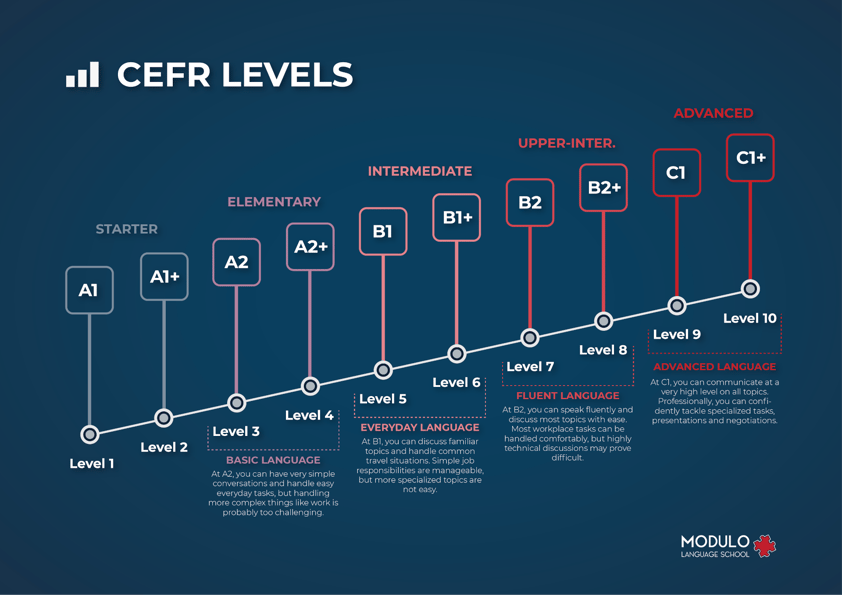CEFR
Modulo에서 사용하는 CEFR 레벨
Modulo는 유럽의 공인 언어 평가 기준인 CEFR체계를 사용합니다.
Modulo
학습 경험
모듈로에서 어떻게 공부하면 좋을지 알려드릴게요
- Step 1 연락 모듈로에 연락하기 시작이 반이다! 성공적인 언어 학습의 첫걸음은 모듈로의 어드바이저와 연락하는 것입니다. 전화나 메시지로 연락을 주시면 친절하게 응대해 드리며 맞춤형 학습 경험을 제공해 드립니다.
- Step 2 상담 목표를 분석하기 여러분이 원하는 것은 모듈로가 잘 하는 일이기도 합니다. 여러분의 목표와 꿈, 언어 사용 계획, 실력 향상 방식에 대해 몇 가지 질문을 드리겠습니다.
- Step 3 진단 진단 평가 및 시범 수업 여러분에게 필요한 것이 무엇인지 알아보세요. 편안한 분위기에서 강점과 약점을 분석할 수 있도록 선생님과 이야기해 보세요. 초보자라면 첫 레슨에서 무엇을 할 수 있는지 보여드리겠습니다.
- Step 4 방법 개인 맞춤 해결책 이제 원하는 것과 필요한 것이 무엇인지 파악했으니, 학생이 목표를 달성할 수 있도록 최적의 방법을 찾기 위해 이야기하는 단계입니다. 학습할 레벨과 구체적인 코스를 추천해 드리고 자세한 일정도 알려드립니다.
- Step 5 학습 언어를 알아가기 우수한 모듈로 선생님들과 함께 공부할 뿐만 아니라, 정기적인 진단 평가를 통해 여러분의 진도와 만족도를 확인합니다. 뿐만 아니라 학습 경험을 지속적으로 개선하기 위해 과정 진행 상황에 대한 피드백을 요청할 것입니다.
Levels
상세 설명
모듈로의 CEFR 수준 살펴보기
| 레벨군 | 레벨 그룹 명칭 | CEFR 레벨 | 레벨 이름 | 설명 |
|---|---|---|---|---|
| A | 초급 사용자 | A1 | 시작하는 사람 또는 초보 |
|
| A2 | 초급 |
|
||
| B | 독립 사용자 | B1 | 초급의 끝자락 또는 중급 |
|
| B2 | 중상급 |
|
||
| C | 능숙한 사용자 | C1 | 효과적인 숙련자 또는 고급 |
|
| C2 | 마스터 또는 능통 |
|
